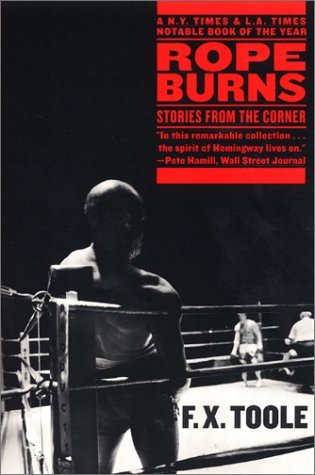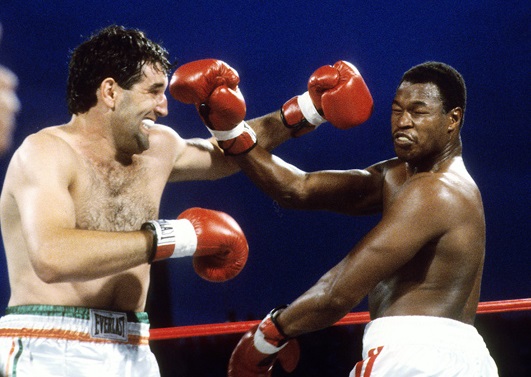Nice tales at all times contain nice characters, so it is smart that so many fiction writers have taken boxers as their topics. Few sports activities make such drastic calls for on the person as boxing, which is why nice fights have such sturdy narratives. Boxing is customized for brief tales and novels.
However most scribes who’ve written concerning the battle recreation have been outsiders, followers and pundits, not boxers themselves. Jack London, who wrote the basic pugilistic story “A Piece Of Steak,” was an newbie fighter and as a journalist coated among the greatest bouts of his day, together with the well-known Jack Johnson vs James J. Jeffries bout in 1910, however he made his fortune as a wordsmith. Joyce Carol Oates, maybe essentially the most sudden and eloquent battle fanatic in up to date letters, by no means claims to be greater than a eager observer of The Candy Science. Ernest Hemingway and Norman Mailer did their share of health club exercises and sparring, however couldn’t declare to really be a part of the boxing world.
 However there may be an exception, a famend author who was actually energetic within the sport: F. X. Toole. Most individuals are acquainted with Toole by Clint Eastwood’s movie Million Greenback Child, which is predicated on two tales from Toole’s debut quick story assortment, Rope Burns. Whereas Toole might not have the celebrity of the writers talked about above, his fiction is required studying for severe battle followers, not solely due to its literary high quality however due to the insider data he gives which few different writers can entry.
However there may be an exception, a famend author who was actually energetic within the sport: F. X. Toole. Most individuals are acquainted with Toole by Clint Eastwood’s movie Million Greenback Child, which is predicated on two tales from Toole’s debut quick story assortment, Rope Burns. Whereas Toole might not have the celebrity of the writers talked about above, his fiction is required studying for severe battle followers, not solely due to its literary high quality however due to the insider data he gives which few different writers can entry.
F. X. Toole, the pen identify of Jerry Boyd, was late to the battle recreation. He didn’t begin coaching in a boxing health club till he was 46 years previous, and whereas he by no means fought professionally, he went on to make a dwelling for himself as a coach and a minimize man. Beforehand he’d labored a myriad of jobs, together with a flip as a matador. However like so many others, after he found boxing, that grew to become his life, his identification.
However in contrast to so many others, he additionally wrote. For many years, whereas he labored corners and educated fighters, he by no means instructed his associates in boxing about his writing as a result of he didn’t get any of it printed. However when Toole was 69 his first story appeared, which led to his first book-length assortment and finally a novel which was printed after his demise. He’s the boxing insider who additionally grew to become a literary hit.
Toole’s work and time within the sport reveals in all his tales and it’s the bodily particulars that display this. For instance, from his novel Pound for Pound: “It was there within the stink and spit that he discovered to develop the nails on his thumbs and forefingers longer than on his different fingers, to higher snag and take away adhesive tape from his hand wraps after sparring.”
Nobody who had not lived the battle recreation might embrace one thing like this and lend such genuine texture to his writing. One other instance from Pound for Pound:
“Dan had seen it earlier than. You by no means knew when the cotton mouth or the empty ass would hit you. Fighters with twenty-five fights would typically must take a scare pee after they’d been gloved and have been already making their option to the ring. When it occurred, Dan would pull a fast U-turn at ringside and run the boy again to the dressing room. He’d have to drag the boy’s shorts and cup down, then intention his shriveled dick so he wouldn’t piss on his footwear.”
Whereas concern earlier than a battle is intuitive, the small print of how a coach offers with it will probably come solely from a author who has seen younger boxers expertise it. And the slang Toole makes use of, resembling “empty ass,” is the vocabulary of these initiated into the battle recreation.
Toole’s tales are filled with particulars like these, with the material of a fighter’s life that continues to be invisible to these of us who see solely what transpires from the opening bell to the referee elevating the winner’s arm. And to his credit score, Toole doesn’t romanticize his insider information. He’s trustworthy concerning the hardships, the ache, the implications, and likewise the glory, when, and if, it comes.
However what Toole is most trustworthy about is race. It have to be remembered that boxing, like different sports activities, has an unlucky historical past of racism, however the trendy recreation has a robust streak of egalitarianism which the informal battle fan might not see. In Toole’s tales, completely different races combine and mingle as a result of in boxing one is much much less outlined by pores and skin shade or ethnicity than he’s by his wits and abilities contained in the ropes. Being a member of “the flamboyant,” as Toole calls the boxing neighborhood, can at instances transcend racial tensions and prejudice. From the story “Rope Burns”:
“The South was nonetheless de facto Jim Crow territory within the late sixties when Mac and Cannonball traveled to locations like Houston and even DC. Whites would put up a stink typically, however they’d shut up as soon as they knew they have been messing with members of the flamboyant. Many would even settle all the way down to reward Joe Louis, Henry Armstrong, and Sugar Ray, for whom that they had nice respect and of whom they have been real followers.”
Toole addresses the much less savory aspect as effectively. In “Combating in Philly,” a narrative set in my dwelling city which has each a wealthy boxing historical past and a typically troublesome racial previous, the principle character, a cornerman, muses on the tendency of white followers to desire a white champion:
“He knew how badly white individuals wished a white heavyweight champ, how a lot they’d pay. He wished they’d had a white boy, too. He would be capable of assist his personal children that method, assist them get a leg up …”

This passage brings up reminiscences of historic fights resembling Larry Holmes vs Gerry Cooney, when America tried to will a “Nice White Hope” to victory within the glamour division. However inside a web page of that very same story, Toole turns to the extra fair-minded aspect of race in boxing in a second when a boxer returns to his former coaching crew, “his black daddy and his white grandpa.”
As a rule in Toole’s tales, race is introduced up in an affectionate method. Jokes are good-natured as a result of characters respect one another. There are various scenes the place a personality of 1 race immerses himself within the tradition of others. That is particularly outstanding provided that a lot of Toole’s writing is ready in Southern California, the place black fighters eat burritos after tournaments and Latinos hand around in pubs and rejoice wins with their Irish trainers. His characters aren’t saints, however they continuously overcome a specific hurdle too many individuals nonetheless stumble over, and it’s the tradition of boxing that enables them to take action.
Toole’s quick tales stand out from his novel. They’re polished and exact. Since they don’t glorify the game or apotheosize fighters, they learn extra just like the work of Raymond Carver than Hemingway. Pound for Pound, Toole’s solely novel, is price studying, although it’s a deeply flawed work printed after the writer’s demise. Toole’s coronary heart gave out earlier than he might full the manuscript and his agent labored on 900 pages of fabric to form it right into a novel. Consequently, Pound for Pound lacks focus and scenes learn as bloated with minor characters getting an excessive amount of time on the web page. However it’s nonetheless clearly the work of a author who knew each side of the battle recreation, and for that purpose it’s price studying.
F. X. Toole’s literary life was a brief one, however he put many years of boxing information into wealthy characters and completely managed prose. Studying him makes one really feel part of “the flamboyant” for a number of hundred pages, and there are few higher compliments to pay a boxing author than that. — Joshua Isard

